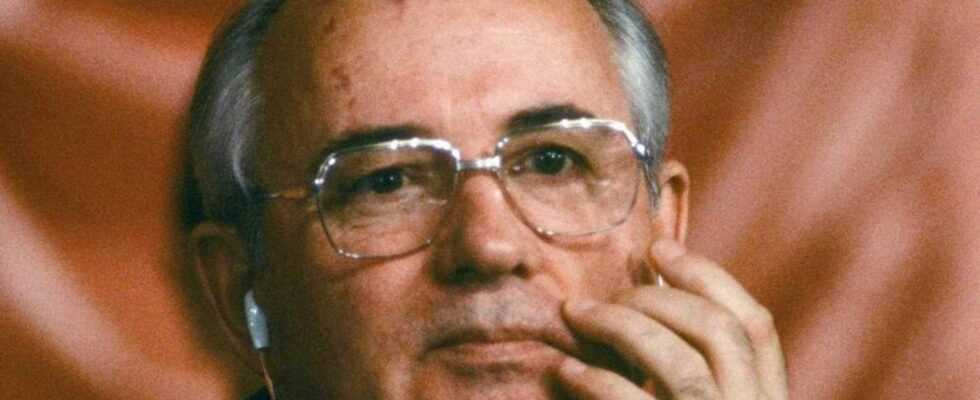Mikhail Gorbachev, the man to whom the Germans largely owe their unity, can hardly be seen today. That's how he lives.
What does Mikhail Sergeyevich Gorbachev (89) actually do? The man to whom the Germans largely owe their political unity has almost completely disappeared from the public eye. The 89-year-old Nobel Peace Prize laureate lives secluded in a dacha in a suburb of Moscow.
It is said that his health is not particularly good. At a book presentation two years ago, one of his last public appearances, witnesses describe a severely aged Gorbachev who leaned on his walking stick and on the hand of an employee.
"He's a real revolutionary"
He was once one of the most powerful men in the world. The son of a combine harvester operator in the North Caucasus will go down in history as one of the great reformers and reconcilers with the West. The last General Secretary of the CPSU and first President of the Soviet Union initiated perestroika and thus the end of the cold war between the West and the East. The long-time German Foreign Minister Hans-Dietrich Genscher (1927-2016) said of him: "Gorbachev initiated a revolution with the policy of perestroika. He is a real revolutionary. He started a freedom revolution."
Above all, Gorbachev encouraged the Germans to reunify as early as 1989; months before that, that was considered completely utopian. In 1990 he was awarded the Nobel Peace Prize for this. Ultimately, his opening to the west also meant the end of the Soviet empire, which many in his Russian homeland have not forgiven him. For some, he's even a traitor.
His wife had to endure a lot
A few months after a failed coup attempt in August 1991, Gorbachev resigned as President of the USSR. Previously, the presidents of Russia, Belarus and Ukraine had contractually agreed the official dissolution of the Soviet Union. This ended Gorbachev's political career. For the Germans, the Russian was and is a political hero. Gorbachev's wife Raissa (1932-1999), who had cancer, was also treated in Germany. The charismatic sociology professor was his great love and always at his side.
His wife was also very respected in the west, but in the east she had a rather controversial position among the population due to her glamorous appearance. Political circles took advantage of this. In the final stages of the Soviet Union, intrigues were scattered against Raissa in order to meet her husband. She suffered a lot from the criticism and malice he was exposed to because of his reform policy, says Gorbachev in an interview with "Stern". "My family was right in the middle of the fiery kettle of perestroika. They had to endure terrible things. For Raissa, my wife, that was just too much."
Intrigue in Russia
Before the military coup in 1991, she was suffering from leukemia. Further health setbacks followed. Nevertheless, rumors were stoked in Russia that Raisa Gorbacheva only wanted to distract from her husband's weaknesses – intrigues that her husband has not coped with to this day, as he told the "Stern": Shortly before her death, she said a sentence, "which herself forever engraved in me: 'Do I really have to die for people to believe me?' ".
Raissa Gorbatschowa died on September 20, 1999 at the age of 67 in the Münster University Hospital, leaving behind a completely desperate widower. His daughter Irina (63) said at the time that he no longer wanted to live. Raissa was buried in the cemetery of the Moscow New Maiden Convent. Her grave is adorned with a sculpture of a flower girl, which her husband always has fresh flowers adorn.
Gorbachev speaks up
After the death of his wife, Gorbachev visited Germany several times. Daughter Irina had bought the stately Hubertus-Schlössl (17 rooms) in Rottach-Egern am Tegernsee, where the former Kremlin boss liked to go on vacation and take walks on Tegernsee. In the meantime he can allegedly no longer undertake such trips.
Despite his poor health, the ex-president repeatedly speaks out politically. He writes books, looks after his Gorbachev Foundation, supported by his daughter Irina, fights for human rights – and defends his homeland. To Bild he said: "Nobody is more worried about Ukraine than we Russians. When I ask this question, I think of my mother. She was Ukrainian. And the second woman in my life who I also lost, Raissa, was also Ukrainian . "
After he was honored with the Andrew Order, Russia's highest honor, in 2011, he praised his successor: "I will resolutely defend Russia and its President Vladimir Putin (67). I am absolutely convinced that Putin is better than anyone today Pursuing interests of Russia. Of course there is something in its politics that can be criticized. But I don't want to do this, nor do I want anyone else to do it. "
He denied reports that he had joined Christianity ("I am still an atheist") as well as a hacker attack in which his demise was announced in a café in Yekaterinburg: "You hope in vain. I am alive and fine. " He doesn't want to party again until March 2nd, 2031. He'll be 100 years old then.
